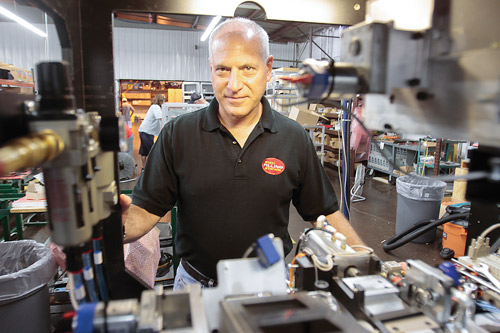RYO Filling Station in Girard is looking for a miracle


Phil Accordino, president of RYO Filling Station in Girard, stands behind one of the last vending machines to roll cigarettes the company will produce. A change to federal law is forcing the company to shut down.
By Burton Speakman
bspeakman@vindy.com
GIRARD
Work on cigarette-rolling vending machines continued as normal early this week, but short of a miracle, they all will be silent and employees out of work as soon as Monday at RYO Filling Station in Girard.
Company President Phil Accordino said a federal bill taxes his machines, which help customers roll their own cigarettes, at a higher rate than manufactured cigarettes and will put him out of business. Accordino’s company makes machines that take loose tobacco and make it into cigarettes for customers.
The change to the taxes regarding loose tobacco was passed as part of the transportation bill. It creates a form of “double taxation” on the product, he said.
“All the taxes already have to be paid on the loose tobacco, then if they use the machine the taxes have be paid for a manufactured product,” Accordino said. “The companies can then request back the tax for the [loose tobacco], so companies would have to sell the product for less than they paid for it. No business is going to do that.”
Nationally RYO has placed 1,000 of its machines in tobacco stores in its 41⁄2 years in operation, he said.
The major tobacco companies thought the machines were a threat and tried multiple methods to eliminate the machines that failed before finding a congressman willing to put in an amendment adding tax to the machine, Accordino said.
U.S. Rep. Steven C.
LaTourette, R-14th, which includes part of Trumbull County, was one of the few legislators who spoke out against the change to the tax code being added to the transportation bill.
“We just didn’t feel like this belonged in the transportation bill,” said Dino DiSanto, chief of staff for LaTourette. “It’s not something that should be slipped in under the cover of darkness.”
The transportation bill includes roads and buildings. Then there is this part of the bill that changes the way a product is taxed, he said.
This was something that deserved hearings and more discussion before it was voted on, DiSanto said.
“The only hope [for RYO] is for this to be revisited in the next congress,” he said.
Even then it might be too late with RYO, and some its suppliers may already be out of business and unable to return, DiSanto said.
There have been personal use exemptions for tobacco, beer and wine for people who want to make their own since the 1950s, Accordino said.
There have also been businesses where people can make beer or wine using their own product under the tutelage of experts for years along with products to help people roll cigarettes. None of these businesses have been taxed as manufacturers.
“Our business is not tremendously innovative. We essentially stole the concept from those other industries,” he said.
Technology has existed to help consumers roll their own cigarettes since the 1920s. The RYO machine was just a more efficient model and it allowed people to not make a mess at home rolling their own cigarettes, Accordino said.
The company had 42 employees working at the Girard facility making the machines, of which 10 have already been laid off. In addition, each business where the machines are located has hired at least two additional employees to help oversee the machines, he said.
“Companies that produce supplies for the machines say we support another 400 jobs in Ohio alone,” Accordino said.
Since the rolling machines were removed from the Cheap Tobacco store, which is owned by Accordino and located next to RYO Filling Station, the number of customers purchasing loose tobacco has gone down by 60 percent, said Jessica Garland, an employee at the store.
“A lot of people have said they are going to quit [smoking],” she said.
Most of those people will come back over time, Accordino said.
“They’re just protesting right now,” he said.
The store has already laid off four workers since the machines were removed, Accordino said.
“People are supportive if they don’t have to be too vocal,” Accordino said. “We’re not the most politically correct business.”
The employees are still hopeful that something will be done to save the business, but Accordino said he does not believe it will remain open.
“In a free-market society, government shouldn’t be in the business of picking and choosing winners,” he said. “In this case, they have chosen the winners.”
 43
43
